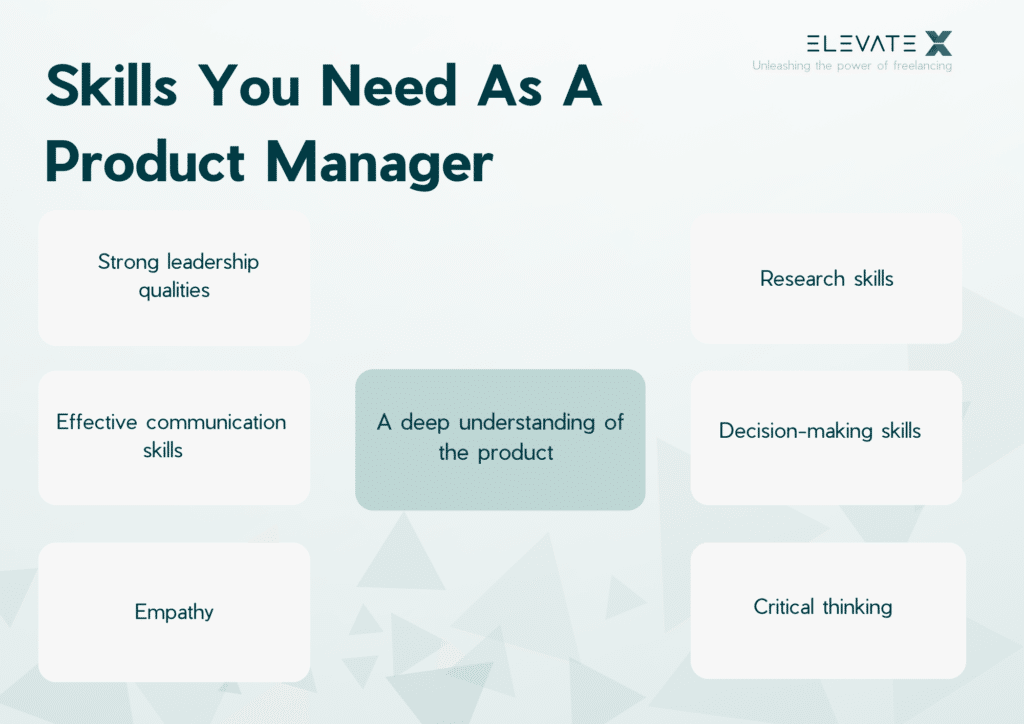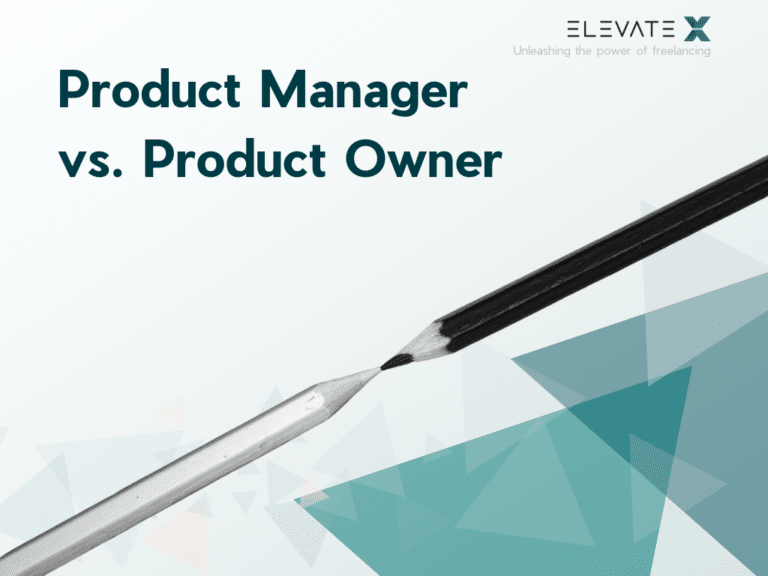The roles of the Product Manager and the Product Owner are both crucial for product management. The Product Manager focuses on the strategic alignment, vision, and roadmap of the product, while the Product Owner is responsible for implementing the requirements in the agile development process. In some cases, both roles can be taken on by the same person, but close collaboration and clear communication between them are crucial. In this article, we will take a closer look at the differences between the roles and the required skills.
The Role Of A Product Manager
The Product Manager has an important task: they must decide what development steps should come next. Their work can be divided into various categories:
- Explore user needs: The Product Manager conducts user research to find out what users need and gains important insights in the process.
- Develop long-term vision and strategy: They work on the long-term vision and strategy of the product, ensuring that the entire team shares it.
- Create a product roadmap: The Product Manager ensures that the team has a clear and coherent product roadmap to guide them.
- Prioritize features: They decide which features should be developed next and set the right priorities.
- Develop compelling features: The Product Manager works on developing features that excite customers and provide value.
- Support the team and stakeholders: They support the team, partners, and external stakeholders to ensure that everyone is aligned with the overall product strategy and direction.
The Product Manager has a holistic and demanding role that covers the entire product lifecycle. From exploring customer needs to delivering the finished product, the Product Manager drives the product strategy. They act as the voice of the customers, a visionary for the product, a supporter of the team, and a strategic leader.
Due to their diverse responsibilities and strategic alignment, Product Managers are often referred to as “mini-CEOs” because they carry a similar level of responsibility.
Which Skills Does A Product Manager Need?
Product Managers play a crucial role in ensuring the success of a product by maintaining direct communication with users, actively listening to their problems, conducting thorough research, empathizing with their needs, and strategically planning initiatives to effectively address their concerns. To excel in this role, Product Managers need to possess a range of essential skills. These skills include:
- Strong leadership qualities to guide the product development process
- Effective communication skills to clearly convey ideas and requirements
- Empathy to understand and connect with users on a deeper level
- Research skills to gather valuable insights
- Decision-making skills to make informed decisions
- Critical thinking to analyze complex situations
- A deep understanding of the product itself
By leveraging these skills, Product Managers can drive the development of successful products that truly meet the needs of their users.

KEY POINTS
- The Product Manager focuses on the strategic direction, vision and roadmap of the product.
- The Product Owner is responsible for implementing the requirements in the agile development process.
- While the Product Manager has a strategic role and is responsible for the entire product lifecycle, the Product Owner’s role is more focused and involves close collaboration with the development team.
- To be successful, both Product Manager and Product Owner need to work well together
The Role Of A Product Owner
Product owners play a crucial role in the Scrum framework, which represents an agile approach to developing and maintaining complex products. According to the official Scrum Guide, the “product owner is responsible for maximizing the value of the product resulting from the work of the development team.”
One of the main responsibilities of the product owner is backlog grooming. In addition, they take on the following tasks:
- Convert customer problems and concerns into actionable user stories, prioritize them, and organize them in the product backlog.
- Establish and prioritize production processes to ensure that the development team has a clear understanding of their upcoming tasks.
- Attend all Scrum meetings to ensure that the development aligns with the product manager’s roadmap.
- Act as a liaison between the customer and the development team and effectively convey the voice of the customer.
- Provide feedback on the validated roadmap to the product manager.
While the product manager has a strategic role and is responsible for the entire product lifecycle, the role of the product owner is more focused and involves close collaboration with the development team. The product manager primarily interacts with customers, while the product owner primarily works with the production team to ensure that the development processes align with the product roadmap.
What Skills Does A Product Owner Need?
Product Owners need to have excellent communication skills, listening abilities, and empathy since a large part of their role involves translating the Product Manager’s suggestions to the UX, engineering, and development teams.
Additionally, they need to work on some more specific skills required for their role: Since POs are part of the Scrum framework, they should be familiar with agile methodologies and the use of Scrum tools like Kanban.
POs also need to work in a timely manner and have a sense of responsibility and accountability. Product Owners bridge the strategies of the Product Manager with the implementation. If they don’t act quickly, the process will stall and bottlenecks will occur.
Are you searching for a Product Manager?
Is A Product Manager The Same As A Product Owner?
A common misconception in product management is assuming that a Product Manager and a Product Owner can be used interchangeably. However, although the two roles are closely related and often collaborate in agile development teams, there are subtle differences worth examining.
The Product Manager is responsible for the strategic alignment of the product. This role focuses on developing and implementing a clear product vision, identifying market trends and customer needs, and creating a roadmap for the product. The Product Manager works closely with various stakeholders, including management, developers, and the marketing team, to ensure the successful positioning of the product in the market.
On the other hand, we have the Product Owner, who plays a central role in agile development. The Product Owner is responsible for defining the product’s requirements and priorities to achieve maximum customer value. This role works closely with the development team and ensures that the product requirements are clearly defined and continuously adapted to meet the changing needs of customers. The Product Owner prioritizes the tasks of the development team and ensures that the product’s functionalities are delivered on time.
Can A Product Owner Also Be A Product Manager?
Although both roles have different focuses, it is important to note that in practice, the boundaries between them can sometimes blur. In some organizations, a person can take on both the role of Product Manager and Product Owner. This is often the case in smaller teams where resources are limited. In larger companies, however, the roles are typically more clearly defined and distributed among different individuals.
To be successful, both the Product Manager and Product Owner need to collaborate well and ensure close alignment. Clear communication and a shared understanding of the product vision and strategy are crucial to ensure that the product meets customer needs while also supporting business goals.
Conclusion
The role of a Product Manager is diverse and encompasses the strategic alignment of the product throughout its lifecycle. With leadership qualities, communication skills, empathy, and a deep understanding of the product, they can develop successful products that meet user needs.
Product Owners are an integral part of the Scrum framework and focus on collaborating with the development team to define the product’s requirements and priorities. They need to have excellent communication skills, agile knowledge, and a sense of responsibility to achieve maximum customer value.
Although the roles of Product Manager and Product Owner have different focuses, in some cases, they can be performed by the same person. Close collaboration and clear communication between the two roles are crucial for success and meeting customer needs.
A Product Manager has a holistic and demanding role that covers the entire product lifecycle. From researching customer needs to delivering the finished product, the Product Manager drives the product strategy. They serve as the voice of the customers, a visionary for the product, a supporter of the team, and a strategic leader.
Product Owners are a crucial component of the Scrum framework, which represents an agile approach to developing and maintaining complex products. According to the official Scrum Guide, the “Product Owner is responsible for maximizing the value of the product resulting from the work of the Development Team.”
The Product Manager is responsible for the strategic alignment of the product. This role focuses on developing and implementing a clear product vision, identifying market trends and customer needs, and creating a roadmap for the product.
The Product Owner is responsible for defining the product’s requirements and priorities to achieve maximum customer value. This role works closely with the development team and ensures that the product requirements are clearly defined and continuously adjusted to meet the changing needs of customers.








